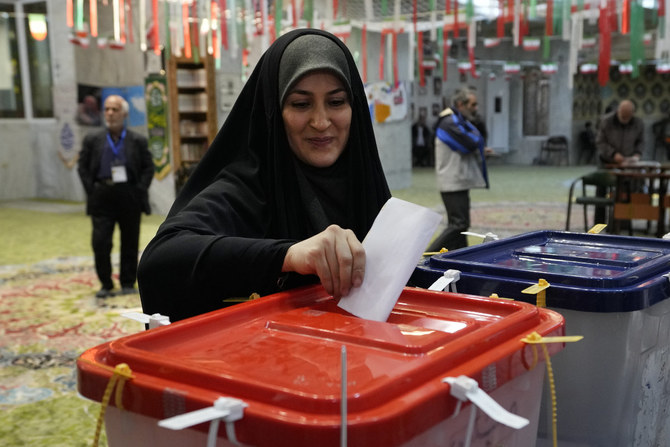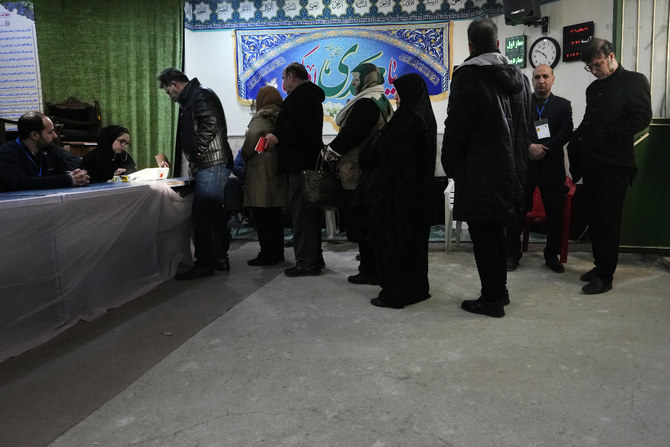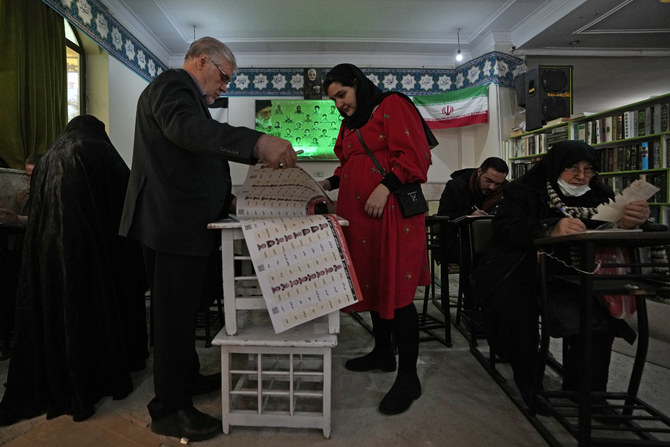





TEHRAN: Iranians voted on Friday in elections for parliament and a key clerical body, amid fears of a low turnout and with conservatives expected to tighten their grip on power.
Supreme leader Ayatollah Ali Khamenei, who has called for a strong turnout, was the first to cast his ballot. He vote at a polling station in central Tehran, state television reported.
The elections are the first in Iran since widespread protests erupted after the death in custody of Mahsa Amini, following her arrest for an alleged breach of the country’s strict dress code for women.
Since the last elections, Iran has also been badly affected by international sanctions that have led to an economic crisis.
More than 61 million of Iran’s 85 million people are eligible to vote for members of parliament as well as the clerics of the Assembly of Experts, which selects Iran’s supreme leader.
There were fears of a low turnout, however, after a state TV poll found more than half of respondents were indifferent about the elections.
“Suppose that I vote: what would it change?” asked a 21-year-old from Kurdistan province who gave her name only as Hanna, for fear of reprisals. “They (the elected officials) do not respect their promises.”
Her comments were echoed by Hashem, a 32-year-old from the southwestern province of Khuzestan. “The problem with the elections is that people are not happy with this system because of the political and economic situation,” he said.
Another voter, Moradiani from south Tehran, said she would heed Khamenei’s call to vote.
“The leader said that participating in the elections is an obligation,” she said, “just as it is obligatory for us to pray.”
Polls closed at midnight (2030 GMT), after voting hours were extended several times during the day, the official IRNA news agency reported.
Local Fars news agency estimated the turnout to stand at “more than 40 percent.”
“The plan to boycott the elections, designed by foreign enemies and their internal supporters, failed with the participation of around 25 million people,” it said, without elaborating
Iran’s last parliamentary election in 2020 saw turnout of 42.57 percent — the lowest since the 1979 Islamic Revolution.
Hadi Tahan Nazif, spokesman for the Guardian Council which vets candidates, voiced optimism about Friday’s turnout, saying it was “even better” than four years ago.
Khamenei had on Friday appealed for people to vote, saying: “Onlookers from all over observe the affairs of our country; make (Iran’s) friends happy and ill-wishers disappointed.”
The supreme leader had previously warned that Iran’s “enemies want to see if the people are present.” Otherwise, he added, “they will threaten your security in one way or another.”
Those watching, he said, included the United States, “most of the Europeans, evil Zionists, capitalists and big companies.”
Iran considers the United States, its Western allies and Israel “enemies” of the state and accuses them of seeking to intervene in its internal affairs.
On the eve of the elections, the United States said they would be unfair.
“I have no expectation that Iran’s elections will be free and fair, and I suspect that a great number of Iranians have no expectation that those elections will be free and fair,” US State Department spokesman Matthew Miller told reporters in Washington.
Candidates for parliament are vetted by the Guardian Council, whose members are either appointed or approved by the supreme leader.
They have approved a total of 15,200 candidates, out of nearly 49,000 applicants, to run for seats in the 290-member parliament.
Conservatives and ultra-conservatives, who hold 232 out 290 seats in the 2020 parliament after reformist and moderate candidates were disqualified, are expected by analysts to dominate once again.
A coalition of parties called the Reform Front said it would not take part in “meaningless, non-competitive and ineffective elections.”
Former Iranian president, the reformist Mohammad Khatami, was quoted in February by the conservative Javan daily as saying that Iran was “very far from free and competitive elections.”
Conservatives are also expected to maintain a firm grip on the Assembly of Experts, an 88-member body exclusively made up of male Islamic scholars.
A total of 144 candidates are running but many hopefuls were disqualified, including moderate former president Hassan Rouhani.
The Israel-Hamas war has sent tensions in the region soaring, with pro-Tehran groups in Lebanon, Iraq, Syria and Yemen all involved in clashes with either Israel or its Western allies.
The elections also take place amid crippling international sanctions and mounting economic hardship in Iran, where inflation has hovered around 50 percent and the rial has sharply depreciated against the dollar.
“The prices are extremely high and continue to increase,” Masoumeh, a 40-year-old housewife, told AFP in Tehran’s Grand Bazaar ahead of the vote.
“I don’t think that the representatives who will be elected will be able to improve this situation.”
AFP